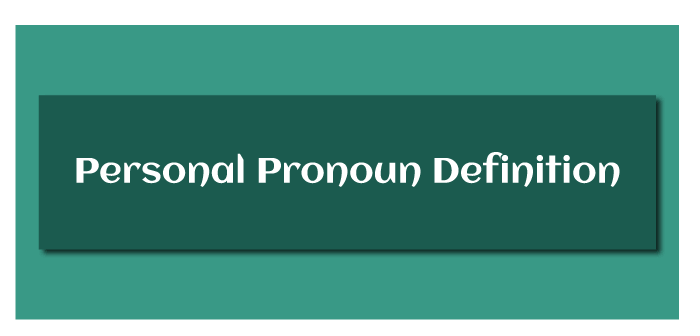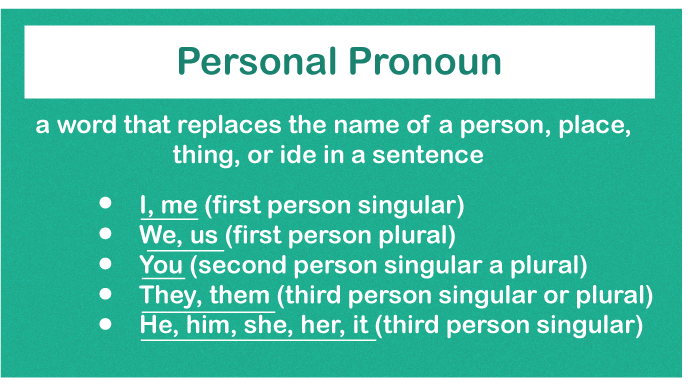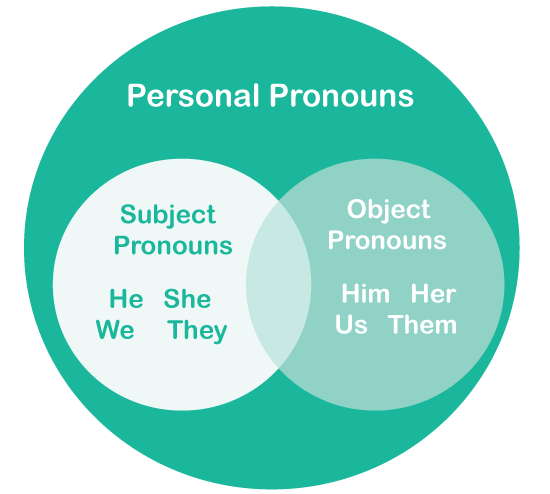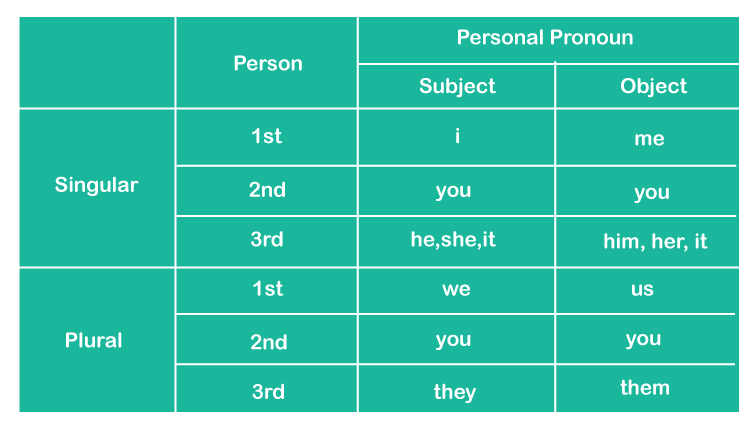Personal Pronoun DefinitionNouns play an important role in both our writing and our speech. Yet, using the same noun continuously might result in some extremely repetitive sentences: The dog barked. The dog was barking. The dog was searching for its owner. After the dog ate, the dog slept in the place ready for the dog. Enough is enough! Allow this dog to relax and stop repeating the same noun! To prevent disastrous statements like these, we can substitute pronouns for nouns. Pronouns are regularly used words, and one sort of pronoun, in particular, lends a personal feel to a sentence: the personal pronoun. 
What Exactly Is a Personal Pronoun?A personal pronoun implies to the pronoun that is often utilized to relate to the speaker or the individuals or objects to which the speaker is alluding. Personal pronouns are frequently used instead of proper names, as in Irene went to sleep early since she (Irene) worked hard tonight. Personal pronouns, just like all other pronouns, only replace nouns rather than other parts of speech such as verbs or adjectives. In the grammatical sense, they function exactly like nouns, and can perform the functions as the subjects or objects of a clause, expressions, or sentences. Normally personal pronouns are utilized to imply to the individuals. However these can also be utilized to imply to the animals. Here is an instance of this; I bought a new kit for my kitty, and he adores it. Certain personal pronouns can also imply to the inanimate objects or concepts, like; Our villa looked lovely after we colored it. Follow the instructions of the dish exactly, because they must be done in a precise order. Personal Pronoun DefinitionsHere are a few definitions by prominent dictionaries;

Personal Pronouns as Subject PronounsPersonal pronoun can also serve as the subject pronoun. Whenever it substitutes the noun as the subject of the statement or paragraph, it functions as both a personal the subject pronoun. What exactly is a subject pronoun? In the grammatical sense, it implies to any kind of pronoun utilized to alternative to the common or proper noun as the subject of a statement. Whenever a personal pronoun is utilized to imply to the individual, animal, location, or object that is also the sentence's subject, it is characterized as both a personal pronoun and the subjecat pronoun. Personal Pronouns as Object PronounsPersonal pronoun can also serve as the object pronoun. This happens when this pronoun is used as the direct or indirect object of a verb, or as the object of a preposition. What exactly is an object pronoun? Any pronoun that is impacted by the action of the sentence's subject. Personal pronouns utilized as object pronouns are distinct from personal pronouns utilized as subject pronouns, yet they are equally significant. "Me, you, him, her, it, us, and them are the 7 object pronouns that serve as personal pronouns." How To Use Personal PronounsPersonal pronouns are valuable assets of English Grammar. These kind of pronoun are useful as with the help of these speaker can refer to people and things that too without having the need to repeat their names again and again during a conversation. Personal pronouns are commonly divided into three kinds: first person, second person, and third person.
What Is a Gender-Neutral And Nonbinary Pronoun?Gender-neutral and nonbinary pronouns have become important with changes in times and advancements. As per singular personal pronouns, the words she, her, he, and him are genders-specific and only exhibit and convey the gender of an individual or animal. There are, however, numerous more personal pronouns in English Grammar that are not gender-specific. It is critical not to incorrectly identify somebody by using gendered terminology when it is not required. To make sure that your oral and written interactions are accommodating all gender identities, utilize gender-neutral terminology. If you are confused with the choice of personal pronoun or wanting to skip using a gendered pronoun then you may go with the pronoun "they. It is is an ideal option. The gender-neutral or nonbinary pronoun "they" is usually substituted for gender-specific pronouns like "he" and "she" by putting to use a single gender-neutral or nonbinary pronoun. Numerous people are now incorporating this phrase as a gender-neutral option. "They" can be utilized when you don't want to clarify someone's gender or when alluding to a nonbinary individual. However, it is critical to always utilize the person's preferred pronouns. Respecting individuals's preferred pronouns is a critical component of fostering a welcome and inclusive atmosphere for individuals of all genders. Rules and Usage of Personal PronounsPersonal Pronoun Usage and RulesPersonal pronouns are very important component of English Grammar. These are often used to replace a noun or a noun phrases in the statements/ paragraphs. Personal pronouns are classified into 4 kinds namely;
The correct use of these pronouns is critical for effectively communicating a message and avoiding ambiguity. Using Gender Neutral Personal PronounsWith the passage of time and rise of diversity the usage of the use of gender-neutral personal pronouns has become the new important aspect in English Grammar Language. These pronouns are utilized to show/ exhibit respect for everbody, especially non-binary and the gender nonconforming individuals. The Singular and Plural 'You'The pronoun 'you' is commonly used in both singular and plural forms. 'In a sentence, the pronoun 'you' can refer to a single person, a group of people, or an audience as a whole. Example 1: You are from Washington, right? In the above mentioned statement, 'you' can be either be the male or the female. Example 2: Did you do your homework? 'You' in the instance cited above can refer to a solitary or plural noun, as well as a team of male and female pupils. 'They' and 'Them'The third-person pronouns 'they' and 'them' put to use when the gender of the person is unknow or neutral. The usage of these pronouns has risen in recent years in order to be inclusive of non-binary people. Example 1: Everybody has to make certain if he/she has his/her essential papers before he/she goes into the test room. Individuals use he/she or him/her when writing for the broader audience. However this can also be written as; Everybody has to make certain if they have an identification card before they go into the examination hall. The Use of Subject and Object PronounsUtilizing subject and object pronouns correctly is one of the most important things you must practice if you want to speak clearly. 'Me' vs 'I' Amongst the subject and object pronouns, the pronouns 'me' and 'I' are those that are most frequently misused. This can be made easy and straightforward if you understand that the pronoun 'I' constantly serves as the subject pronoun and the pronoun 'me' as the object pronoun. Example 1: Fiza, Jenna and me headed to see a film last evening. (Incorrect) Because'me' is an object pronoun, it cannot be employed as a subject pronoun in the preceding phrase. The right usage is as follows: Fiza, Jenna and I headed to see a film last evening. (Correct) Example 2: All that I would require for the next two months were given to me on the initial day. The pronoun 'me' is utilized here since the statement's object is receiving the act. In conclusion, utilizing personal pronouns correctly and responsibly is critical for efficient communication. Gender-neutral pronouns are also becoming increasingly crucial in modern society in order to encourage inclusivity as well as respect for all people. 
Examples of Personal PronounsLet us have a look at examples of Personal Pronouns for better understanding; In a sentence, personal pronouns refer to individuals or groups of people. They can be used as subjects or objects in sentences, as well as to signify possession. Below are 15 examples of personal pronouns with explanations, namely
Personal pronouns are vital in communication because they provide clarity and precision when addressing individuals or groups of people. It is critical to use them properly to avoid confusion and properly convey information. Sentence Examples of Personal PronounsHere are some examples of Personal Pronouns in Sentences on the basis of above explanation.
How Are Subject Pronouns and Object Pronouns Related to Personal Pronouns?Personal pronouns are a sort of pronoun that is employed to reduce sentence repetition. These pronouns are specifically connected to individual, group, animal, or the objects. Personal pronouns are split in 3 kinds: subject pronouns, object pronouns, and possessive pronouns. Subject pronouns, usually include the words "I", "you", "he", "she", "it", "we", and "they",. These are frequently employed as the subject of the statement. Object pronouns, imply to the subject of the statement. These include the terms: "me", "you", "him", "her", "it", "us", and "them". It is challenging and tricky to distinguish between the object pronoun and the subject pronoun. However, it is essential to remember that sentence is always centred on the subject and the object is affected and impacted by the attutude and behaviour of the subject. In the sentence "I gave the keyboard to her," "I" is the subject and "her" is the object in the statement. Subject and object pronouns, just similarly to the personal pronouns, can take different forms depending of the number. This implies whether they are singular or plural. In addition, they can be put to use in English sentences along with any of the three personal pronouns- first, second, or third. It is important to note that subject pronouns and the object pronouns are closely related to each other as well as other perosnal pronouns. For instance the word, "he" implies the male person, and the word "she" implies to the female subject. The object pronoun "him" is for a male, whereas the pronoun "her" is for the female. In conclusion, personal pronouns are an important component of language that is utilized to reduce phrase duplication. Subject and object pronouns are two forms of personal pronouns that fulfill different grammatical tasks but both relate to a certain person, group, animal, or item. They can take on various forms based on the quantity and grammatical persons and they might vary based on the natural or grammatical gender of the word being addressed to. Important Points To Remember About Personal Pronouns
ConclusionFinally, personal pronouns are important in communication and must be used carefully to avoid misconceptions and communicate a clear message. It is critical to grasp the many sorts of personal pronouns and how to use them correctly. We may show respect, inclusion, and sensitivity to persons and groups with varied gender identities and expressions by using the appropriate personal pronouns. It is also critical to be mindful of frequent errors when using personal pronouns, such as presuming someone's gender or using the incorrect pronoun. We can build a more inclusive and courteous society in which everyone feels seen and heard if we make an intentional choice to use personal pronouns properly.
Next TopicCarnivore Definition
|
 For Videos Join Our Youtube Channel: Join Now
For Videos Join Our Youtube Channel: Join Now
Feedback
- Send your Feedback to [email protected]
Help Others, Please Share











